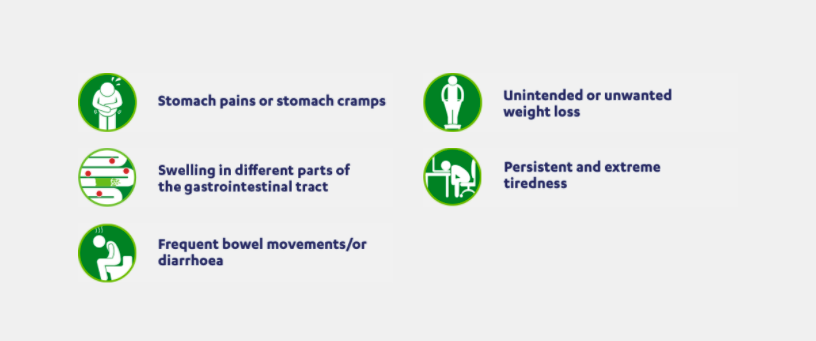About IBD

What is inflammatory bowel disease?
When your doctor talks about inflammatory bowel disease, or IBD, they are usually referring to chronic (long-term or life-long) conditions such as Crohn’s disease (CD) or ulcerative colitis (UC).1 IBD is not the same as irritable bowel syndrome (IBS), which is a non-inflammatory condition.12
Although the exact cause of IBD remains largely unknown, advances in research have improved our understanding of the disease. It is now believed that IBD is caused by a combination of factors including the genes you are born with, an abnormal reaction of the immune system to certain bacteria in your gut, along with an unknown trigger which may be associated with diet or stress.34
Watch the video ‘Understanding Inflammatory Bowel Disease (IBD)’ to discover more about IBD and the impact it can have on people living with CD and UC, along with a brief look inside the immune system and its relationship with IBD.
IBD is estimated to possibly affect around 3.7 million people across Europe5.

If you have recently been diagnosed with IBD, the ‘My IBD Journey: Life after diagnosis’ (see below) animation provides practical advice and positive steps recommended by people living with IBD.
Symptoms of IBD

Some other symptoms include:

These symptoms can come and go, sometimes without warning, and can be caused by triggers such as certain foods or stressful situations, which will be different for each person living with IBD. When the inflammation worsens, and you experience more symptoms of your disease, it is called a ‘flare-up’. The quiet or symptomless period of time between flare-ups is called ‘remission’.6
It is not fully understood why some people develop IBD, but genetics play a role and you are more likely to have it if you have a close relative who has or had IBD. Smokers are more likely to be affected by CD and smoking can aggravate the symptoms, so is worth considering quitting if you do smoke.78 As vaping is a new trend, it isn’t yet known if there is a link between vaping and IBD.

